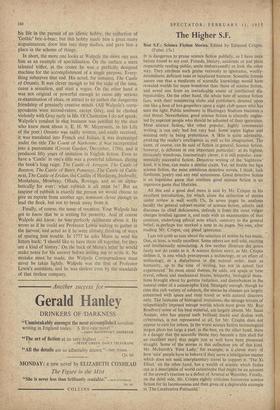The Higher S.F.
Best S.F.: Science Fiction' Stories. Edited by Edmund Crispin. (Faber, 15s.) IT is dangerous to praise science fiction publicly, as I have once before found to my cost. Friends, literary, academic or. just plain
respectable reading public, smile embarrassedly or look the other way. They attribute such praise variously to ignorance, woolly-
mindedness, deficient taste or misplaced humour. Scientific friends assure one that a modicum of scientific knowledge would have revealed worlds far more wondrous than those of science fiction, and saved one from an ineradicable smear of /intellectual dis- reputability. On the other hand, the whole host of science fiction fans, with their ministering clubs and publishers, descend upon
one like a host of hot-gospellers upon a night club queen who has seen the light. Public testitnony in Harringay Stadium becomes a real threat. Nevertheless; good science fiction is absurdly neglec- ted by superior people who should be ashamed of their ignorance. Most science fiction, like 'other popular, highly commercial writing, is not only bad but very bad. Some aspire higher and
succeed only in being pretentious. A liktle is quite admirable, awaking .the reader's intelligence as well as his imagination. The same, of course; can be said of 'fiction in general, Science fiction, / however, is different in one important particular : at its highest, intricately wondrous, fascinatingly clever, it is still popular, com-
mercially successful fiction. Detective' writing of the 'highbrow'
kind, it is true, can make a similar claim. Yet, set beside the INst science fiction, the most ambitious detective novels, I think, lack
freshness, poetry and any real seriousness. Good detective fiction is an ingenious game that confines good science fiction is an ingenious game that liberates. , All this and a good deal more is said by Mr. Crispin in his excellent introduction, for which alone the collection of stories under reView is well worth 15s. In seven pages he analyses lucidly the general subject-matter of science fiction, admits and discusses its chief deficiencies, defends it from the most vulgar charges levelled against it, and ends with an examination of that constant, underlying ethical note which, contrary to 'the general belief, is perhaps too marked a note in its pages. No one, after reading Mr. Crispin, can plead ignorance.
I am not quite so sure about the selection of stories he has made. One, at least, is really excellent. Some others are well told, exciting and intellectually stimulating. A .few neither illustrate the genre fairly nor do credit to it. A science fiction story, as Mr. Crispin defines it, 'is one which presupposes a technology, or an effect of technology, or a disturbance in the natural order, such as humanity, up to the time of writing, has not in actual fact experienced.' Its ,most usual themes, he adds, are space or time travel, robots and mechanical brains, telepathy, biological muta-
tions brought about by gamma radiation, and disturbances in the natural order of a catastrophic kind. Strangely enough, though he
cites this rich variety of subjects, the stories he chooses are largely concerned with space and time travel or with natural disasters only. The fantasies of biological mutations, the strange terrors of telepathically imposed mirage worlds which have given Mr. Ray
Bradbury some of his best material, are largely absent. Mr. Isaac Asimor, who has played such brilliant ducks and drakes with
cybernetics, is not represented at all, for Mr. Crispin does not
appear to care for robots. In the worst science fiction technological jargon plays too large a part; in the, best, on the other hand, there
is a danger that the scientific theme may become a thin shell for
an excellent story that might just as well have been presented straight. Some of the stories in this collection are of. this kind.
Mr. McIntosh's 'First Lady,' for example, is a clever story of how 'nice' people have to behave if they serve a totalitarian master which does not need, interplanetary travel to support it. 'The Xi Effect,' on the other hand, has a wealth of, science which fizzles
out in a description of world catastrophe that might be an account of the crowd's reaction to a defeat of Arsenal at Wembley. Finally,
on the debit side, Mr. Crispin rightly criticises humorous science fiction for its facetiousness and then gives uS a deplorable example in 'The Cerebrative Psittacoid.'
Five of the stories, however, are excellent. Mr. Van Vogt's `Dormant' is a fine example of his sloW, heavy, foreboding themes. Miss St. Clair's Trott' achieves a strange blended mood of pathos, horror and funniness that is unique. Mr. Porges's 'Ruum' is in essence a boy's, adventure story, but it is beautifully told. Mr. Ray Bradbury never fails to please. I do not think 'The Fire Balloons' by any means his best story, but the theme of Catholic theology applied to a new planet is one of the best in science fiction. Will the inhabitants of Mars be in a state of grace that has known no Fall? Mr. Bradbury has a moving solution, but Mr. James Blish, in 'A Case of Conscience,' has a fat more brilliant one. This story is by far the best in the collection. That so subtle and well-written a fantasy could have first appeared in a commercial cnnection



































 Previous page
Previous page